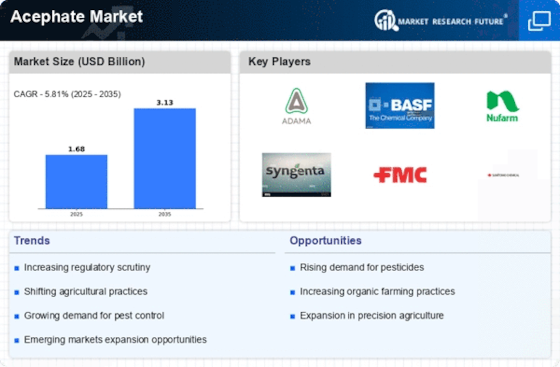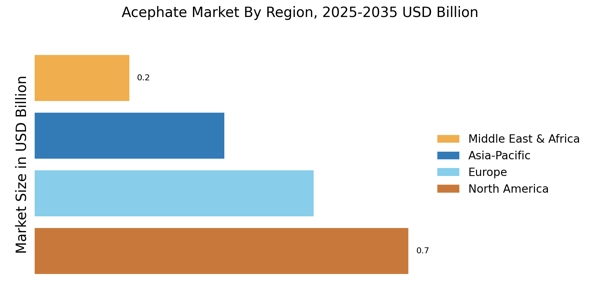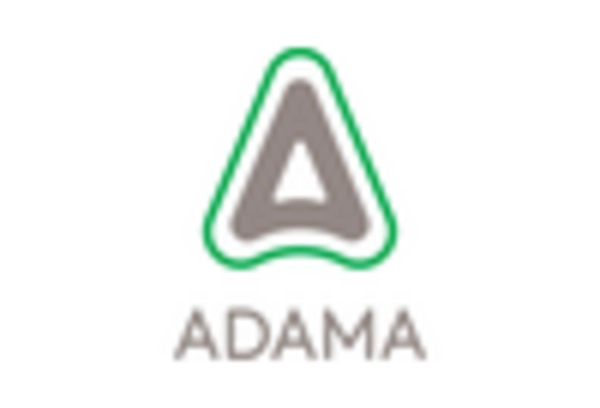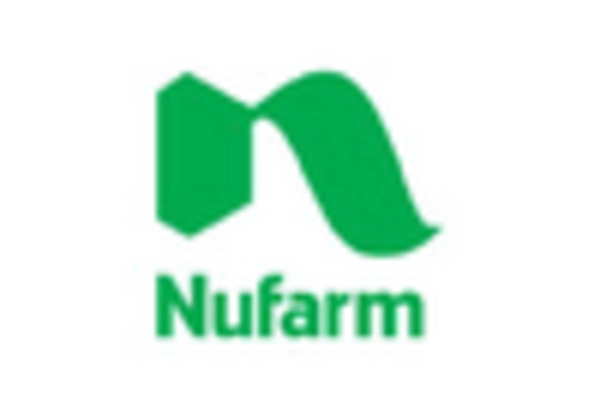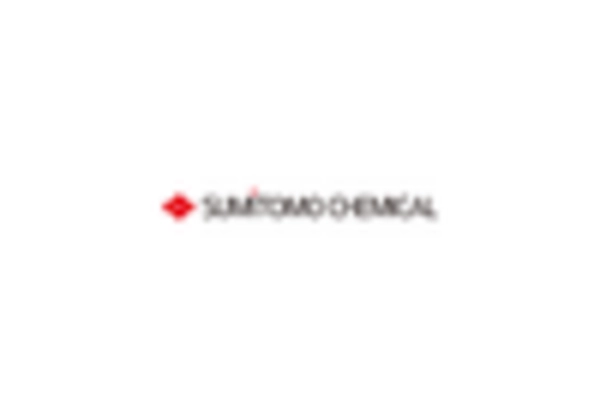Expansion of Agricultural Land
The expansion of agricultural land is a notable driver for the Acephate Market. As the global population continues to grow, there is an increasing demand for food production, prompting the expansion of arable land. This trend is particularly evident in developing regions, where agricultural practices are being intensified to meet food security challenges. The increased cultivation of crops naturally leads to a higher incidence of pest infestations, thereby driving the demand for effective pest control solutions like Acephate Market. According to recent data, the area of cultivated land is expected to increase by approximately 10% by 2025. Consequently, the Acephate Market is likely to see a corresponding rise in demand as farmers seek reliable methods to protect their crops in this expanding agricultural landscape.
Regulatory Support for Pesticide Use
Regulatory frameworks that support the use of effective pesticides are crucial for the Acephate Market. Governments worldwide are recognizing the need for effective pest control solutions to ensure food security and agricultural productivity. As a result, there is a trend towards streamlining the approval processes for pesticides, including Acephate Market. This regulatory support is likely to enhance market access for Acephate Market products, facilitating their adoption among farmers. Moreover, as regulations evolve to accommodate new agricultural practices, the Acephate Market may benefit from increased investment in research and development, leading to improved formulations and applications. This supportive regulatory environment is essential for fostering innovation and ensuring the sustainability of pest management solutions.
Increasing Awareness of Crop Protection
The growing awareness of the importance of crop protection is a significant driver for the Acephate Market. Farmers are becoming increasingly educated about the impact of pests on crop yield and quality. This awareness is leading to a greater willingness to invest in effective pest control solutions, including Acephate Market. According to industry reports, the crop protection market is projected to grow at a CAGR of 5.5% through 2025, indicating a robust demand for effective pesticides. As farmers recognize the economic benefits of protecting their crops, the Acephate Market is likely to experience increased sales and market penetration. This trend is further supported by government initiatives promoting sustainable agricultural practices, which often include integrated pest management strategies.
Rising Demand for Pest Control Solutions
The increasing need for effective pest control solutions is a primary driver in the Acephate Market. As agricultural practices evolve, farmers are seeking reliable methods to protect their crops from pests. This demand is reflected in the projected growth of the pesticide market, which is expected to reach USD 80 billion by 2025. Acephate Market, known for its efficacy against a wide range of pests, is likely to see heightened adoption among farmers. The Acephate Market is thus positioned to benefit from this trend, as more agricultural stakeholders recognize the importance of pest management in ensuring crop yield and quality. Furthermore, the rise in organic farming practices may also lead to a shift in pest control strategies, potentially increasing the demand for Acephate Market as a viable option.
Technological Advancements in Formulation
Technological innovations in pesticide formulation are significantly influencing the Acephate Market. Advances in chemical engineering and formulation techniques have led to the development of more effective and environmentally friendly products. These innovations not only enhance the performance of Acephate Market but also improve its application methods, making it easier for farmers to use. For instance, the introduction of controlled-release formulations may enhance the efficacy of Acephate Market while minimizing environmental impact. As a result, the market is likely to witness an increase in the adoption of these advanced formulations, which could lead to a more sustainable approach to pest management. The Acephate Market stands to gain from these advancements, as they align with the growing emphasis on sustainable agricultural practices.


